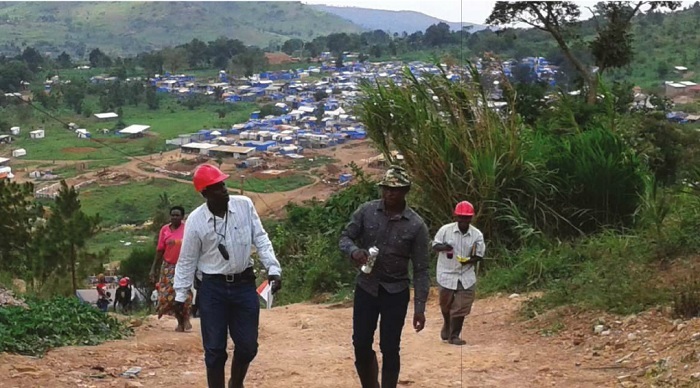
Artisanal miners make a killing from ‘illegal’ gold mining as district authorities, government cry out for more revenue
From a distance, “Saigon City” in Lubaali— Kayonza, Kitumbi Sub-County in Mubende District, resembles a desperately crowded refugee camp.
Here, hundreds of congested makeshift tents and lodging structures are mostly dressed or covered in blue tarpaulins. It could be mistaken for an outpost for people who recently escaped political mayhem. But that is where the refugee comparisons end.
The oddly named ‘Saigon City’ is one of dozens of artisanal and small-scale gold-mining camps that are scattered in the valleys and hills of this sub-county. It is a settlement for artisanal miners whose population comprises thousands of people – women, men, teenage girls and boys, and a few babies. The adults are all here to eke out a living from gold mining.
Saigon is arguably one of the most hyper-active camps in Mubende. From bars selling cold beers and other soft drinks to retail and wholesale shops, salons, clinics, mobile money agents, chapati stalls, entertainment halls connected to satellite TV, lodges, restaurants, mechanical workshops, and even a Pentecostal church, everyone is here to make a killing from gold.
Lubaali is one of several villages in Mubende where Uganda’s gold begins its long journey to Kampala and eventually gets exported to far-away places such as India and Dubai in the United Arab Emirates. This reporter is part of a group of 20 journalists visiting this gold-mining camp to learn firsthand about the activities of artisanal and small scale gold miners in Mubende on this blazing Oct. 13 afternoon. Lubaali, like many other villages in the sub-county, was a laid back rural area. Then gold was discovered a few years ago.
Edward Ssenkusu, the community development officer for Kitumbi Sub-County, says most of the people here were subsistence farmers who used to earn their livelihood from growing maize, beans, cassava and sweet potatoes. But that changed about three years ago when rumours of a gold rush spread like wildfire. He does not say how exactly the discovery was made but, within months, Lubaali was transformed from a quiet and dull village into a miniature bustling township. What is interesting about this gold mining camp is its high level of self-sustenance. Barring the small Police Post within the camp and the private guards inside Saigon City Bar, Restaurant and Lodge, there is little presence of the central government.
Rags to riches
Emmanuel Kibirige never planned to get into artisanal gold mining but the tough conditions forced his hand after he failed to complete his Bachelor of Economics and Statistics degree at Kyambogo University in Kampala due to lack of tuition. Starting out by selling sausages and roasted meat, he then ventured into selling chicken feeds.
Later, he switched to selling produce. This took him to Mubende District. It was on one those trips that he heard about in 2013. He hit Kampala Camp, which is not far from Lubaali.
“I went to the mine with about Shs 40, 000,” he says, “Within four days, I had made close to a million shillings.” Thanks to inspiring rags-to-riches stories like Kibirige’s, district leaders here say the gold mining industry has helped them keep youths busy. Previously, the idle young men used to hang around trading centres playing pool and other board games all day long.
Moses Nkangi, the Kitumbi Sub-County chief, told The Independent on Oct.23 that people in his sub-county at least have work, a development that has reduced crime in his sub-county. Nkangi reckons that there could be about 20,000 people currently working in about ten mining camps in the sub-county. He also sees development in the sub-county. In the past, Nkangi says, Lubaali had many grass-thatched huts but they are slowly giving way to red iron-roofed and brick houses, thanks to income from gold.
Kibuuka Francis Amooti, the LC V Chairman of Mubende, also told The Independent that the gold mining camps in Mubende host close to 60,000 people, who need to feed, drink and get other essential commodities. “Our people have found an opportunity to supply these camps with food and other services,” he says. Nyansio Bassa, the “Mayor” of Saigon City says everyone in Saygon City came to make money. “It does not matter whether they are in the mines or the restaurants; they work as hard as possible to live their dream,” he says.
Bassa says new comers in the mining camp part with about Shs 30,000 for ground space. But if one intends to set up something for accommodation or a retail shop, that will set you back another Shs 5,000, so you will be required to pay about Shs 35,000 to the ‘landlord.’ The prospective gold miner will quickly mobilise resources to dig a pit, several feet deep, create a tunnel and start searching for the elusive gold veins. On some days, one will come out with nothing, rendering days of back-breaking labour worthless. But on some good days, the miner may reach a certain point and upon sampling the soil, find that it has traces of gold. When one finds gold, the rocks and soil from the find are quickly brought onto the surface. Here, another hard process of refining the gold begins.
 The Independent Uganda: You get the Truth we Pay the Price
The Independent Uganda: You get the Truth we Pay the Price



